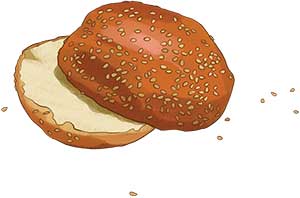What makes eating a hamburger a hands-on experience is it's doughy outerwear, the bun. Whether it enhances the flavor of your burger or merely obviates a fork is determined by who bakes it. Baker Noel Labat-Comess, age 48, says that his hamburger buns are an altogether different animal.
“I learned to cook when I was young. I started with pancakes: I'd whip up the egg whites and fold them in ... I was into anything that was kind of complicated, whether it was cooking or making models. I liked making things with my hands, and cooking was a way of doing that.
“When I was growing up, we ate Pepperidge Farm bread, and my mother bought whole grain bread. She was an Adelle Davis devotee. I had the untradeable sandwiches in school. A peanut butter and jelly on cracked wheat---well, you sure can't get a Twinkie for that!
“But I wasn't crazy into food until I got a little older. In college, I spent a lot of my student loan money giving dinner parties. And then I became the chef at the Quilted Giraffe, in 1981, and we made our own bread because there was nothing on the market that we wanted to buy.
“I started the bakery in '87, in a 1300 square foot building, and now we're literally 30 times the size of that ... there's 40,000 square feet here, and we produce 20,000 pounds of bread a day. Nowadays I'm much more a businessman than I am an artisan. On a day-to-day basis I don't have the same contact with bread making or the same appreciation of it. Where I do appreciate it, probably more than ever, is in eating it!
“In the beginning, I worked mostly night time hours. I'd go to a party with my girlfriend, and at 8:30, I'd look at my watch and say, 'See ya, I gotta go.' And I'd work till eight or nine in the morning. I worked overnight for six years, and it's a very different world. But this is New York, and there's a lot going on at 3 in the morning.You feel like the world's upside down, but it was cool, I liked it. And I was a nocturnal person anyway.
“We had about five or six clients to start off with, and then the executive chef at Shearson Lehman found out about us----he tasted our rolls at some restaurant like Chanterelle's or something---and he called up and said, ‘I want to have those rolls.’ So he became our client. He had been a client of another bakery, over in Newark, New Jersey, and they have an Italian name, though I'm not sure if they actually are Italian. So, I came into work a few days later, and I listened to the messages on the answering machine, and there's a gruff voice saying, ‘Hello, Noel, this is Mr. Pollycastro calling. You took our Shearson account, and we want it back. And if we don't get it back, we will be forced to take evasive action immediately!!’ So I called up a good friend of mine, Eli, a competitor of ours, and I said, ‘What do you know about this guy, Pollycastro?’ And he said, ‘Oh, yeah, I had a run-in with him. He's fulla hot air, don't worry about him.’ But for about 24 hours it had a strong effect on me.
“Our hamburger buns are a very different animal. And price-wise, also. It costs four, six, eight times as much as a basic hamburger bun. They're basically a brioche dough, which is why they're so expensive, because there's eggs, there's butter, and I think there's some milk powder as well. There's less yeast in them than a more industrial product, and they get a longer fermentation, so they have a little more delicate structure and they have a more complex flavor profile.
“I never get sick of bread. But what has happened is that I've become fussier...if it's not good, I'm not going to waste my time. That sounds kind of snotty, but there's no pleasure in it if it's not really good.” |

